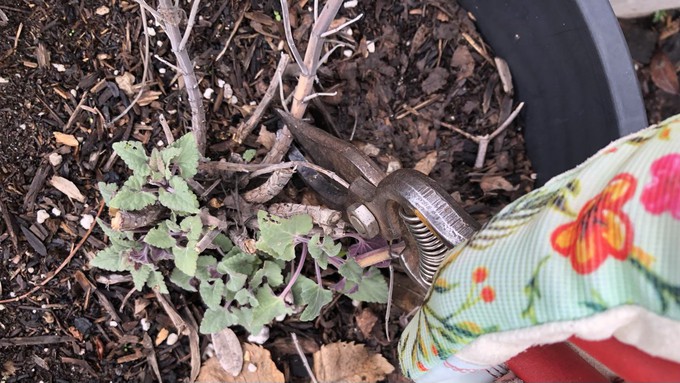
Get tips on tackling roses, trees, shrubs

Perennials such as this potted hyssop also need pruning this time of year. Find out the whys and hows of winter pruning during Green Acres seminars this Saturdays. Kathy Morrison
It’s pruning season – as if we haven’t said that enough – and here’s another source of expert advice: Free pruning seminars this Saturday.
Green Acres Nursery & Supply will host pruning seminars at 10 am. Saturday, Jan. 21, at all seven of its locations. No advance registration necessary.
“Learn when to prune and discover the right techniques from our pros,” says Green Acres.
It’s a great opportunity to ask questions about specific plants and perplexing pruning dilemmas (such as where to start?)
Green Acres staff will tackle roses and fruit trees as well as more unusual shrubs and ornamental trees. Get tips about pruning berries and perennials, too.
Find the right tools for the job; Green Acres staff are garden tool experts and can advise on selecting hand pruners, loppers, saws and other time savers. Make every cut count.
Green Acres is located in Sacramento, Roseville, Folsom, Elk Grove, Rocklin, Auburn and Citrus Heights.
For more details and the location closest to you: www.idiggreenacres.com.
Comments
0 comments have been posted.Sacramento Digs Gardening to your inbox.
Sites We Like
Garden Checklist for week of July 21
Your garden needs you!
* Keep your vegetable garden watered, mulched and weeded. Water before 8 a.m. to reduce the chance of fungal infection and to conserve moisture.
* Feed vegetable plants bone meal, rock phosphate or other fertilizers high in phosphate to stimulate more blooms and fruiting. (But wait until daily high temperatures drop out of the 100s.)
* Don’t let tomatoes wilt or dry out completely. Give tomatoes a deep watering two to three times a week.
* Harvest vegetables promptly to encourage plants to produce more. Squash especially tends to grow rapidly in hot weather. Keep an eye on zucchini.
* Pinch back chrysanthemums for bushy plants and more flowers in September.
* Remove spent flowers from roses, daylilies and other bloomers as they finish flowering.
* Pinch off blooms from basil so the plant will grow more leaves.
* Cut back lavender after flowering to promote a second bloom.
* It's not too late to add a splash of color. Plant petunias, snapdragons, zinnias and marigolds.
* From seed, plant corn, pumpkins, radishes, winter squash and sunflowers.